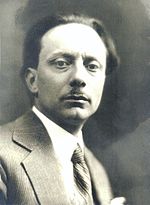Luigi Ugolini
| Luigi Ugolini | |
|---|---|

Luigi Ugolini
|
|
| Born |
June 25, 1891 Florence, Italy |
| Died | June 22, 1980 (aged 88) Florence, Italy |
| Pen name | Giulio D'Albenga |
| Occupation | Writer Essayist Poet Painter |
| Nationality | Italian |
| Period | 1940–1980 |
| Genre | Novelized Biography Fiction Historical Fiction Fantasy/SF Young Adult |
| Notable awards | Premio Castello 1962. Premio Bancerello Sport 1983 |
| Spouse | Lina Vaselli |
| Children | Lydia Ugolini, Maria Luisa Ugolini + 5 |
| Relatives | Vanna Bonta (granddaughter) |
Luigi Ugolini (June 25, 1891 – June 22, 1980) was an Italian writer. He is best known for his series of fictionalized biographies of Italian leaders in art and science, and for a volume of work that immortalizes traditions, values and ways of life of Tuscany and Florence. Ugolini left an early career as a lawyer to write, and his literary works, many of which are inducted as scholastic required reading in Italian schools, earned a worldwide reputation and several prestigious literary awards. He was also a painter, an expert ornithologist and gastronome.
Luigi Ugolini descended from a noble family of Tuscany whose recorded lineage dates back to 1585 in Arezzo, Italy. Ugolini was born in Florence, where his Siena-born father and his grandfather both had medical practices. Ugolini was a nobleman who was known to prefer the company of poor farmers in the regions of Maremma, whom he described as truer gentlemen than many of those so-called gentlemen in the city. Accounts depict Ugolini as playful as he was honestly outspoken. He married Lina Vaselli, and the couple had seven children, four sons and three daughters.
Ugolini attended the Military Academy of Modena and graduated from the University of Pisa with a degree in Law, mainly to honor his father's wishes. After 10 years of practicing law, he made a dramatic move to devote his life to his calling of letters. He was introduced by Giovanni Papini in the leading Italian literary magazine (New Anthology). Ugolini's novels document and give voice to the nearly invisible Tuscan way of life, now absorbed into near nonexistence by a modernized and globalized Italy. For example, in his story of the fearless Domenico Tirbuzi, a Florentine Robin Hood of the poor masses, Ugolini preserves the dialogue, Tuscan dialect, and archaic words particular to the Maremma vernacular. Ugolini's The Story of My Land immortalizes bread making, cooking and many details of classic country life in a now changing Tuscany.
Ugolini was godfather to his granddaughter, the novelist/poet Vanna Bonta. He named her Vanna after the female character in Dante Alighieri's "La Vita Nuova." Lydia Ugolini, Ugolini's eldest daughter and a popular children's writer, returned to the Ugolini home after becoming widowed in 1964. She was appointed by Ugolini as executrix of his literary and personal estate in 1972, and later named to that position by Ugolini's last will and testament. She worked with her father and cared for him until his death in 1980. In his will, Ugolini left half of his estate to Lydia Ugolini, the maximum allowable to a testator by Italian law, and the remainder was divided among his other living children and descendants.
...
Wikipedia
